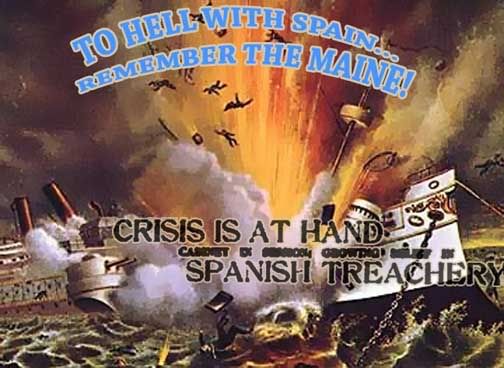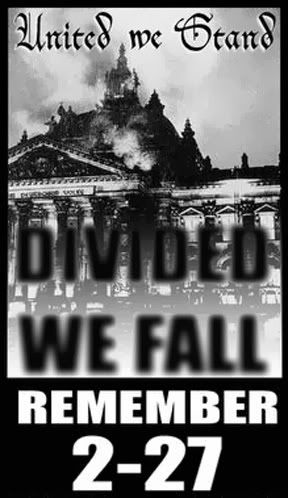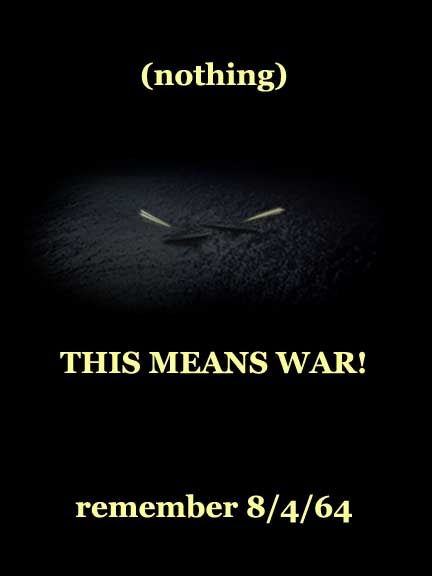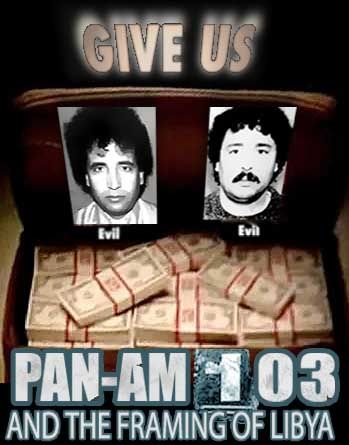[Pan Am 103 Series]
Adam Larson / Caustic Logic
December 31 2009
I recently started an interesting discussion thread at the JREF forum, fishing for thoughts on why people believe the official line on the Lockerbie bombing so fervently. I hadn't yet encountered any serious questions in the course of previous brilliant and provocative discussions - just a few drive-by statements supporting Megrahi's and Col. Gaddafy's absolute guilt, but never accompanied by evidence of any real knowledge. Among the questions and counter-points I suggested people could offer, if they knew anything, was "Libya admitted responsibility and paid out billions of dollars!" And if they had asked, I would answer like this:
There is no doubt that the Libyan government did issue a statement admitting responsibility, and agreed to pay compensation, among other measures, in 2003. It was an explicit pre-condition, inssted by Washington, to having broad UN sanctions lifted. Triploi has always defended its innocence of Lockerbie, but to function in the global economy, they had to do something. Here they managed to not explicitly break the rule, and using careful (cynical?) wordplay, managed to accept responsibility without admitting guilt. Sanctions were lifted.
There’s been much oxymoronic harping on this in the West as both an admission of guilt and an arrogant refusal to admit their guilt. The BBC’s 2008 Conspiracy Files episode on Lockerbie is a brilliant example. “For those that believe al Megrahi was framed,” snarls the narrator, Carolyn Katz, “one fact remains hard to explain away. Libya agreed to award substantial compensation for Lockerbie. Sanctions were then lifted.” Well, ignoring that they just answered their own stumper of a question, it’s a good question, and they continue: “Tripoli accepted responsibility for what it called “the Lockerbie incident.” But does it admit guilt?” Of course not, and by pretending there’s some disconnect, they’ve primed the audience to see the darkest of cynicism at work. Oops, how did that happen?
Under Prolonged Duress
Following he indictment of Libyan agents al Megrahi and Fhimah in late 1991, a process itself twisted with political machinations and riddled with a million broken questions marks, the Security Council moved to enforce the official truth with sanctions. Resolution 748 of 31 March 1992 imposed an arms and air embargo, diplomatic restrictions, and establishment of a sanctions committee. The committee’s work led to Resolution 883 of 11 November 1993, toughening sanctions. This measure “approved the freezing of Libyan funds and financial resources in other countries,” reports globalpolicy.org, “and banned the provision to Libya of equipment for oil refining and transportation.”
By late August 1998 the framework of a trial was established, and used as the measure of Resolution 1192, agreeing to suspend sanctions once the suspects were handed over to the special Scottish court in the Nehterlands at Camp Zeist. Tripoli made it happen, with help from luminaries like Prince Sultan of Saudi Arabia and Nelson Mandela of Africa. Megrahi and Fhimah were flown on a special flight to the Netherlands in early April, and on the 5th were official arrested at Camp Zeist and set to await their trial. Sanctions were immediately suspended, under threat of re-enforcement (that never did materialize).
Many suspect this was never “supposed” to happen, as the evidence behind the indictment was too weak to stand up at Trial. The Crown's prosecutors managed to swing it somehow, but it took nearly two years from the handover, and a display of mental gymnastics worthy of the Realpolitik Olympics in the scale and skill of it. On January 31 2001, the three-judge panel made it official – Megrahi was legally guilty for the plot, and Fhimah was not guilty.
From there, many insisted sanctions should be lifted to reflect Libya’s good faith through this process. But Bush and Blair balked, demanding an admission of responsibility and compensation to victims’ families before they went past suspension. It was a letter, dated 15 August 2003, from Libya’s Permanent Representative to the President of the Council Ahmed A. Own, that paved the way. Own's letter explains “the Libyan Arab Jamahiriya,” as Libya calls itself, “has sought to cooperate in good faith throughout the past years” on solving the problems made theirs “resulting from the Lockerbie incident.” It was in this spirit that they “facilitated the bringing to justice of the two suspects charged with the bombing of Pan Am 103 and accepts responsibility for the actions of its officials.”
The letter also pledged Libya to cooperate with any further investigations, and to settle all compensation claims with haste, and to join the international “War on Terrorism.” It was widely (and reservedly) hailed as a bold… statement. But still evasive. It doesn’t clearly state anywhere the suspects or any Libyans were in any way actually guilty of the “incident.” Nonetheless, after a month of discussion in the Security Council, sanctions were lifted on Sept. 12 2003. France and the US insisted on abstaining, but it was otherwise a unanimous vote of 13. (source) The United States’ own sanctions would remain in full force due to the general evilness of col. Gaddafy, US officials made clear. (Additional normalizations did happen in 2007).
The Blood Libel Edits
Despite his portrayals as a crazed prophet of death, Moammar Gadaffi proved a shrewd and patient pragmatist in all this. He can't have ever believed his nation actually did the crime, but against "guilty" as a legal truth, he accepted they had no choice but to do “the time.” It’s a type of bind known to breed passive-aggressive tendencies. The Colonel’s son and likely successor Saif al Islam al Gaddafi seemed to understand it, when he was interviewed at home for the Conspiracy Files programme.
Q - Does Libya accept responsibility for the attack on Lockerbie?
A - Yes. We wrote a letter to the Security Council, saying that we are responsible for the acts of our employees, or people. But it doesn’t mean that we did it, in fact.
Q - So to be very clear on this, what you’re saying is that you accept responsibility, but you’re not admitting that you did it.
A - Of course.
(edit)
Q - That’s… to many people will sound like a very cynical way to conduct your relationship with the outside world.
A - What can you do? Without writing that letter, you will not be able to get out of the sanction.
Q - So this statement was just word play. It wasn’t an admission of guilt.
A - No. I admit that we play with the words. And we had to. We had to. There was no other… solution.
The BBC are masters, among others, of careful editing, and it helped bolster their whole “you don’t admit you’re guilty” thing where people have to explain there’s nothing to “admit” (or fail to explain that, as happened here). Thus he could, with a little imagination, appear to be saying “we don’t admit it, buuuuut of course we did it, you already know that.” Note the cut that removed some of his words from the middle of the exchange, unlikely to have been irrelevant. Thus is clearly established a cynical payout ($2.7 billion) and bit of semantics to buy up and slough off their non-admitted guilt so they could resume trade. They got away with Lockerbie using money and words and are laughing at us and making more money!
Immediately after “there was no other solution,” the video cuts right to the interviewer asking “so it was like blood money if you like,” which seems to be referring to what was just shown. But really it refers to the American victims' families, whose “money, money, money, money” attitude (well-known and spearheaded by Victims of PA103 Inc.) was “materialistic,” “greedy,” and amounted to “trading with the blood of their sons and daughters.” But with the magic of editing, it can seem to mean so much more!
---












